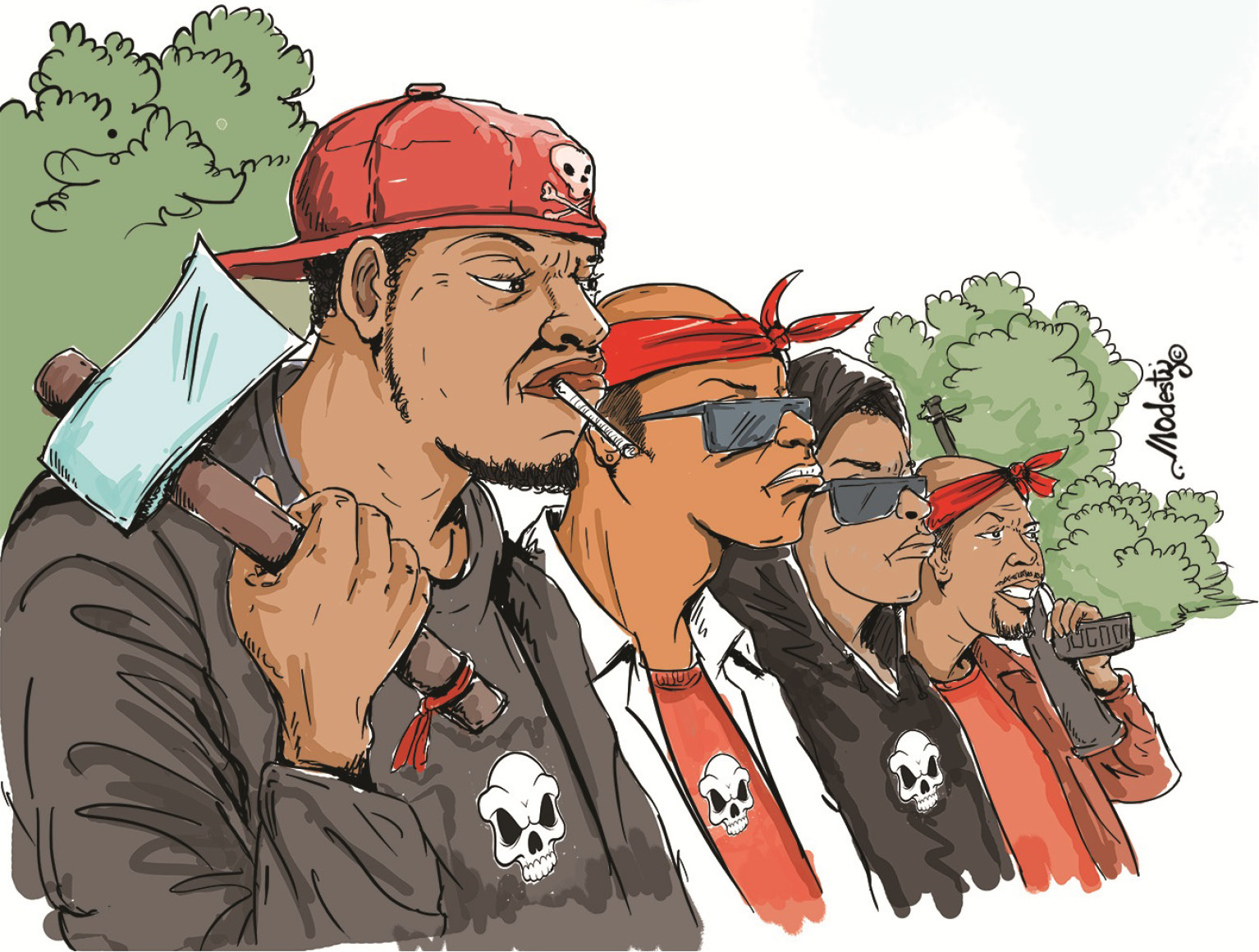At least 92 lives were lost as a result of clashes between rival cult groups in different parts of the country between February and November this year, an investigation by Daily Trust reveals.
This is besides hundreds of cultists arrested by security operatives.
- How I was treated in the Villa – Zainab Buba Galadima
- Inside story of Kaduna’s unending attacks, kidnappings
Experts that spoke to the Daily Trust described “cult” as a group of people associated together for various aims.
Findings show that while some of the clashes occurred on university campuses, others were recorded in different communities in 15 states across the country, especially in the wake of the #EndSARS protest.
Among the victims were members of various cult gangs, as well as innocent people within the affected communities, who were caught up in the clashes.
An analysis of newspaper reports conducted by Daily Trust shows that a total of 42 clashes reportedly occurred in 15 states during the period in review.
A monthly breakdown shows that the highest killings, which led to 24 deaths, were recorded in November, followed by February during which 17 deaths were recorded.
The month of August recorded 12 deaths while May and October recorded 11 deaths each. Similarly, there were 7 deaths recorded in June, while September and July recorded 5 and 2 deaths respectively.
A further breakdown of the 42 cases reviewed shows that Delta State (South-South) had the highest number of cult clashes (7) while Edo and Lagos states recorded the second-highest cases of 6 clashes each.
Benue and Rivers states recorded 4 clashes each; Kwara had 3 cases, while Akwa Ibom, Cross River and Imo recorded 2 clashes respectively. Abia, Bayelsa, Ekiti Kogi, Osun and Oyo recorded 1 case each.
Among the rival cult groups that were involved in the clashes, according to our findings, are Aiye, Aro, Bangas, Eiye Confraternities, Debam, Iceland and Aro Confraternity. Others involved are Greenlanders, Klans, Axe, Red and Black, Scorpion and Skylo, Vikings and Black Axe.
Haruna Isa, a criminologist said the word had been polluted. “If you check the dictionary, you will discover that the term “cult” first appeared in English in 1617. It was derived from the French culte, meaning ‘worship’ which in turn originated from the Latin word cultus meaning ‘care, cultivation, worship,’” he said.
According to him, “cultism in Nigeria many African countries simply relates to crime, spilling blood, rivalry and envy. Some people join cult groups in order to get fame and quick money through rituals.
“It is common to have such groups in schools, places of work and sometimes in so-called places of worship; it is one of the major societal problems that must be tamed,” he said.
How the clashes occurred
By the last count, no fewer than 12 persons were reportedly killed in Edo State as a result of clashes between rival cult groups. The clashes reportedly occurred between Aiye and Vikings.
An Assistant Commissioner of Police (ACP) in charge of the area command and two other senior police officers were also shot during one of the clashes at the popular Murtala Muhammed Way, close to Third East Circular road junction, near Sakponba road in the capital city.
It was gathered that soldiers had been deployed to the troubled areas of Upper Sakponba, Idogbo, Three House Junction, and adjoining locations, where the activities of the cultists had sent residents fleeing for their lives.
There were also killings in separate locations in the city by rival cult groups. Four persons were killed in Isihor Quarters, near the Ugbowo campus of the University of Benin (UNIBEN) in Ovia North East Council.
At the Upper Sakponba axis in Ikpoba-Okha Council, one person was reportedly killed on Thursday morning, while two other persons were also killed in Ogida Quarters in Egor Council on Wednesday and two in New Benin, by Constain junction during a gun duel between rival cult groups.
It was also in view of the clashes in Edo that the Inspector-General of Police, Mohammed Adamu directed the launch of the Police Campaign Against Cultism and other Vices (POCACOV) in Edo State.
Elsewhere in Benue State, a 400-Level Mass Communication student of the state-owned university in Makurdi and one other person were reportedly shot dead in the Gyado Villa area of Makurdi town by alleged rival cult members in February this year.
The victims were said to have been watching football at a popular viewing centre, where the assailants shot them at close range.
An eyewitness was quoted as saying, “We were watching a football match at the viewing centre when about three young men suspected to be cult members came into the place about 10 pm, searching for their target.”
It was gathered that the killing of the duo brought to six the number of persons previously killed in the area in what appeared to be a rival cult war in the community that hosts a large population of Benue State University (BSU) students.
Earlier in February, at least eight persons were reportedly killed during a clash between members of Aiye and Bagger cult gangs in Orhuwhorun and neighbouring communities under Udu Local Government Area of Delta State.
The clash between the two rival cult groups, which had lasted for over a week, had forced residents to desert their homes for fear of being attacked.
Similarly, a 35-year-old pregnant woman, Risikat Saliman, was reportedly shot dead during a bloody clash between suspected cult groups at Aleke community in Ikorodu, Lagos State last September.
It was gathered that dozens of suspected cultists had invaded the community market at about 8 pm on a fateful day and started shooting sporadically, killing the woman in the process.
The Baale of Aleke, Adeniyi Okemati, was quoted as saying that the hoodlums had gunned down the mother of two before the arrival of policemen from Imota division.
Earlier in February, at least eight people were reportedly killed in Okporowo village in Ogbakiri clan, Emohua Local Government Area of Rivers State following a cult clash. The victims were said to be members of a particular cult group in the area, who were killed by their colleagues.
It was gathered that the clash was between the old and new generation members of the cult group. The new generation members of the cult had chased their older members away from the area in a bid to be in charge of the group.
In another incident in Rivers that occurred in August, three persons were killed while many sustained injuries as two rival cult groups clashed in the Luebe community, Khana Local Government Area of Rivers State.
Similarly, two persons were reportedly killed in October from an attack by suspected cult members in Maraba/Alalubosa area of Ilorin, the Kwara State capital. The killing was said to be an aftermath of an attack on an #EndSARS protester in Ilorin.
The head of one of the deceased was said to have been severed from his body and deposited at the General Post Office bridge in the metropolis, while the second victim was killed at the Sabo Oke area in the metropolis.
‘Cult wars caused by #EndSARS protest’
Speaking on the situation, a special investigator and security analyst, Kabiru Adamu, said the upsurge in cult-related activities, which he referred to as ‘gang violence,’ is not unconnected with the consequences of the #EndSARS protesters and the impact it had on the morale of security agencies and the insecurities associated with festive seasons.
“It is apparent from all indications that the security agencies such as the police either withdrew or for some reasons, were not present in the strict sense. What we appear to be witnessing is turf warfare between the different gangs that exist in our different communities. So, ordinary citizens are caught sometimes in between this violence,” he said.
Adamu called on the government to conduct a sociological study of the causes of cultism in society to understand the nature and factors behind it. He said the study would help to identify and engage the culprits through psycho-social reorientation and vocational training, while the hardened ones would be punished according to the law.
Also speaking, a security analyst, Senator Iroegbu, said the collapse of state security control over non-state actors and the overall lawlessness across the country may have led to the upsurge in cultism in the country.
Iroegbu said cultism had always been part of the society, especially in higher institutions, which he blamed on family values, use of substances and growing culture of ‘might is right.’
He recommended youth reorientation programmes, especially with the economic hardship in the country, as well as more emphasis on family upbringing.

 Join Daily Trust WhatsApp Community For Quick Access To News and Happenings Around You.
Join Daily Trust WhatsApp Community For Quick Access To News and Happenings Around You.


